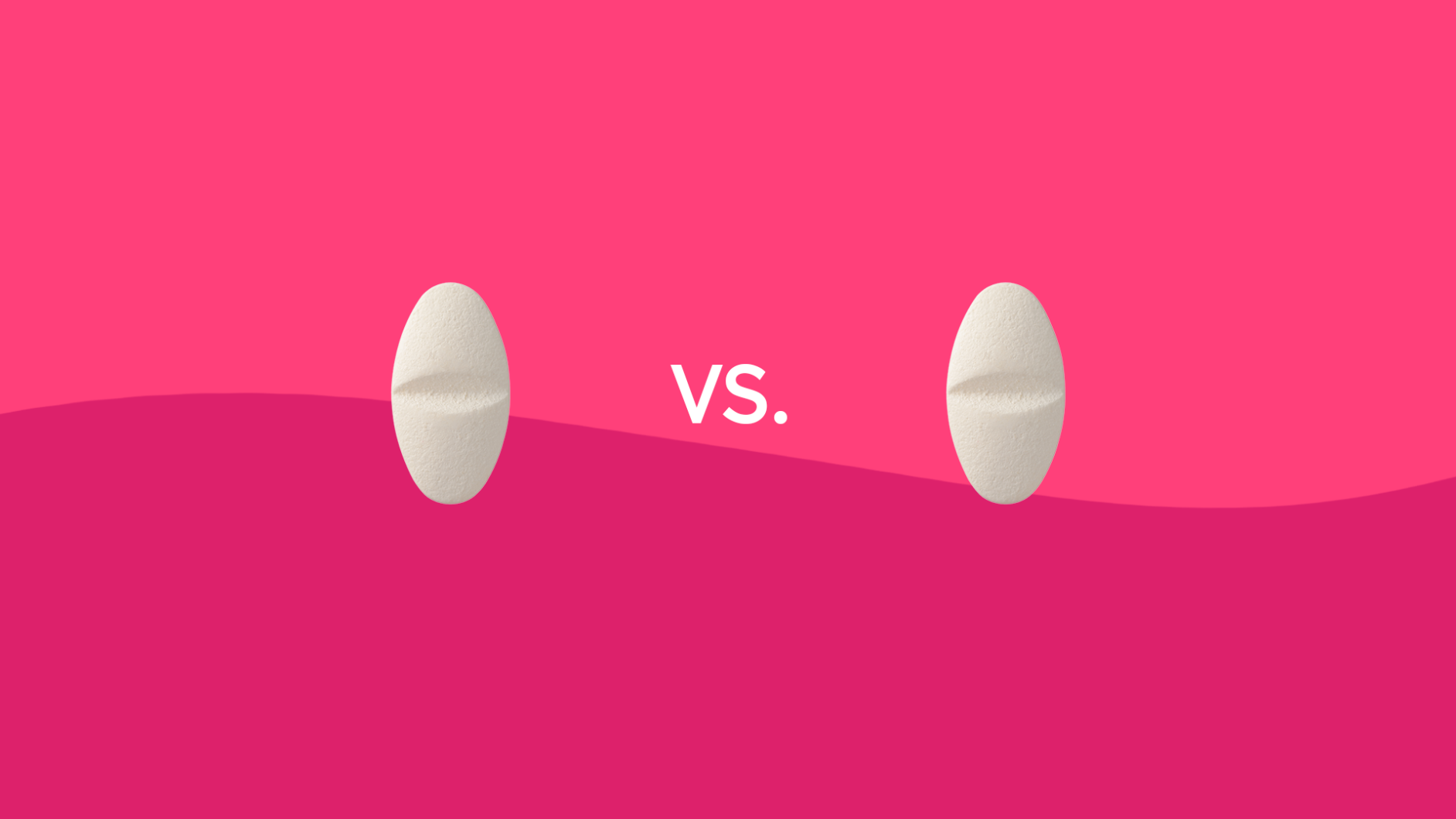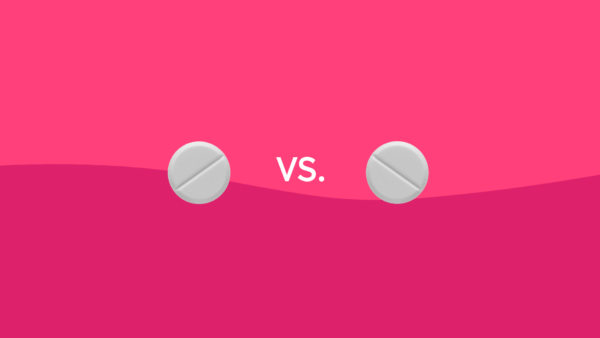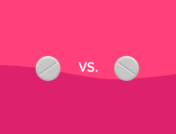Drug overview & main differences | Conditions treated | Efficacy | Insurance coverage and cost comparison | Side effects | Drug interactions | Warnings | FAQ
Klonopin (clonazepam) and Ativan (lorazepam) are two medications that can treat anxiety disorders. Both medications are classified as benzodiazepines which work by binding to GABA receptors in the brain. GABA (gamma-aminobutyric acid) is a major neurotransmitter in the brain that has inhibitory effects. While both drugs work in similar ways, they have some differences in how they are used.
Both Klonopin and Ativan are considered intermediate-acting benzodiazepines. This means their effects may last longer than similar drugs.
What are the main differences between Klonopin vs. Ativan?
Klonopin (What is Klonopin?) is the brand name for clonazepam. It is used to treat panic disorder and seizures. Klonopin stays in the body relatively long with a half-life of 30 to 40 hours. This means that a person can still feel the lingering effects of Klonopin for some time after it’s taken.
Ativan (What is Ativan?) is the brand name for lorazepam. It can be used to treat anxiety and seizures. The injectable form can also be used for anesthesia before certain procedures. Ativan has a half-life of around 20 hours in the body.
| Main differences between Klonopin vs. Ativan | ||
|---|---|---|
| Klonopin | Ativan | |
| Drug class | Benzodiazepine | Benzodiazepine |
| Brand/generic status | Generic version available | Generic version available |
| What is the generic name? What is the brand name? |
Generic name: Clonazepam Brand name: Klonopin |
Generic name: Lorazepam Brand name: Ativan |
| What form(s) does the drug come in? | Oral tablet | Oral tablet Injection |
| What is the standard dosage? | 0.25 mg twice per day depending on your doctor’s instruction | 1 mg twice per day depending on your doctor’s instruction |
| How long is the typical treatment? | Daily depending on your doctor’s instruction | Daily depending on your doctor’s instruction |
| Who typically uses the medication? | Panic disorder: Adults 18 years and older Seizures: Adults or children up to 10 years old |
Anxiety: Adults or children 12 years and older |
Want the best price on Klonopin?
Sign up for Klonopin price alerts and find out when the price changes!
Conditions treated by Klonopin and Ativan
Both Klonopin and Ativan are FDA approved to treat seizures. Klonopin can treat akinetic and myoclonic seizures as well as those resulting from Lennox-Gastaut syndrome. Ativan is used to treat a more severe type of seizure called status epilepticus.
Klonopin is prescribed to treat symptoms of anxiety and recurring panic attacks. Ativan is used to treat anxiety or anxiety that results from depression. Both drugs can be used off-label for other types of anxiety disorders such as social phobia.
Ativan is FDA approved to treat insomnia whereas some doctors prescribe Klonopin off-label for sleeping problems. Other off-label uses for Klonopin and Ativan include treating alcohol withdrawal and agitation.
| Condition | Klonopin | Ativan |
| Seizures | Yes | Yes |
| Anxiety | Yes | Yes |
| Panic disorder | Yes | Off-label |
| Insomnia | Off-label | Yes |
| Alcohol withdrawal symptoms | Off-label | Off-label |
Is Klonopin or Ativan more effective?
In general, both Klonopin and Ativan are effective drug treatments. Because they have been studied for other purposes, their effectiveness can vary depending on the condition being treated.
In a multicenter study, the active ingredients in Klonopin (clonazepam) and Ativan (lorazepam) were found to be equally effective for treating anxiety disorders. There were no significant differences found between these drugs when looking at improvements in anxiety and sleep scores. However, the study found that there were fewer side effects with clonazepam (26.7% versus 43.9%).
Another study compared the use of clonazepam and lorazepam for status epilepticus, a severe type of seizure. Although lorazepam is approved and more widely used for status epilepticus, clonazepam was found to be a useful alternative. Clonazepam is sometimes used off-label for this purpose.
Consult your doctor or healthcare provider who can give appropriate medical advice. Depending on your medical history, one option may be better than the other.
Want the best price on Ativan?
Sign up for Ativan price alerts and find out when the price changes!
Coverage and cost comparison of Klonopin vs. Ativan
Generic Klonopin is usually covered by Medicare and most insurance plans. The average retail cost of Klonopin is about $241. With a SingleCare discount card, you can save on generic Klonopin and pay around $10.
Generic Ativan is usually covered by Medicare and most insurance plans. The average retail cost of Ativan is about $21. With a SingleCare discount card, you can save on generic Ativan and pay around $7.
Try the SingleCare prescription discount card
| Klonopin | Ativan | |
| Typically covered by insurance? | Yes | Yes |
| Typically covered by Medicare? | Yes | Yes |
| Standard dosage | 1 mg tablets (supply of 60) | 0.5 mg tablets (supply of 30) |
| Typical Medicare copay | Depends on your insurance plan | Depends on your insurance plan |
| SingleCare cost | $10 | $7 |
Common side effects of Klonopin and Ativan
Klonopin and Ativan have similar side effects, mainly affecting the central nervous system (CNS). As CNS depressants, these drugs can cause drowsiness, dizziness, impaired thinking or memory, and unsteadiness or problems with coordination. Both drugs may also cause or worsen depression in some people, especially those with untreated depression.
| Klonopin | Ativan | |||
| Side Effect | Applicable? | Frequency | Applicable? | Frequency |
| Drowsiness | Yes | 7% | Yes | 15.9% |
| Depression | Yes | 4% | Yes | n/a |
| Dizziness | Yes | 1% | Yes | 6.9% |
| Nervousness | Yes | 1% | No | – |
| Lack of coordination | Yes | 1% | Yes | 3.4% |
| Cognitive dysfunction | Yes | 1% | Yes | n/a |
| Weakness | No | – | Yes | 4.2% |
*Consult your healthcare provider for all possible side effects.
Source: DailyMed (Klonopin), DailyMed (Ativan)
Drug interactions of Klonopin vs. Ativan
Klonopin and Ativan can interact with other drugs that cause similar effects. Taking narcotics or opioids with benzodiazepines can increase side effects such as sedation, drowsiness, and, in severe cases, slowed breathing, coma, and death.
Benzodiazepines can interact with other CNS depressant drugs such as anticonvulsants, antidepressants, antipsychotics, anesthetics, barbiturates, and other sedatives. Using these drugs together can increase side effects such as drowsiness and sedation.
Because Klonopin and Ativan are processed in the liver, they should be avoided or monitored with other drugs that are processed in the same way. Liver enzyme inhibitors include erythromycin, ketoconazole, and ritonavir which can increase the level of benzodiazepines in the body and increase their side effects. Liver enzyme inducers include carbamazepine and phenytoin which can decrease the level of benzodiazepines in the body.
| Drug | Drug Class | Klonopin | Ativan |
| Codeine Oxycodone Hydrocodone Morphine Methadone |
Opioids | Yes | Yes |
| Phenytoin Carbamazepine Lamotrigine Valproic acid |
Anticonvulsants | Yes | Yes |
| Phenobarbital Pentobarbital Secobarbital |
Barbiturates | Yes | Yes |
| Haloperidol Olanzapine Risperidone |
Antipsychotics | Yes | Yes |
| Amitriptyline Desipramine Doxepin Nortriptyline |
Tricyclic antidepressants | Yes | Yes |
| Rasagiline Isocarboxazid Phenelzine Selegiline Tranylcypromine |
Monoamine oxidase inhibitor (MAOI) | Yes | Yes |
| Probenecid | Uricosuric | Yes | Yes |
| Theophylline Aminophylline |
Methylxanthine | Yes | Yes |
| Erythromycin Clarithromycin Telithromycin Rifampin |
Antibiotic | Yes | Yes |
| Ketoconazole Itraconazole |
Antifungal agent | Yes | Yes |
*This may not be a complete list of all possible drug interactions. Consult a doctor with all medications you may be taking.
Warnings of Klonopin and Ativan
Taking Benzodiazepines and opioids together should be avoided. Doing so can cause a greater risk of respiratory depression, coma, and death.
Benzodiazepines are considered Schedule IV drugs by the DEA. In other words, they have some potential for abuse and dependence. Therefore, they are usually recommended for short-term use only.
Klonopin and Ativan should be avoided in the elderly or in those who may be at risk for falls. Because both drugs affect the liver, they should also be monitored in those with liver disease.
Klonopin and Ativan are listed in Pregnancy Category D. Therefore, they should not be taken during pregnancy. Consult a doctor regarding steps to take while planning pregnancy. They should also be avoided or monitored while breastfeeding.
Frequently asked questions about Klonopin vs. Ativan
What is Klonopin?
Klonopin is an intermediate-acting benzodiazepine. The generic name for Klonopin is clonazepam. It is approved to treat seizures and panic disorders (including agoraphobia). Klonopin requires a medical evaluation and prescription.
What is Ativan?
Ativan is a brand-name benzodiazepine that is known by its generic name lorazepam. It is approved to treat anxiety and certain types of seizures. As a schedule IV drug, it may have the potential for abuse and physical or psychological dependence.
Are Klonopin and Ativan the same?
Klonopin (clonazepam) and Ativan (lorazepam) are similar benzodiazepines that work in identical ways. While they both can treat anxiety disorders and some seizures, they have differences in how long they work. Ativan can also be used as premedication for anesthesia whereas Klonopin is not usually used for this purpose.
Is Klonopin or Ativan better?
Klonopin and Ativan are both effective prescription drugs for treating certain conditions including anxiety and seizure disorders. Depending on your medical history, you may be prescribed one over the other.
Can I use Klonopin or Ativan while pregnant?
Klonopin and Ativan are not recommended for pregnant women. Taking benzodiazepines while pregnant may increase the risk of birth defects. Consult a doctor to see if the benefits may outweigh the risks.
Can I use Klonopin or Ativan with alcohol?
Klonopin and Ativan are not recommended while drinking alcohol. Doing so can increase the risk of drowsiness and sedation. Drinking alcohol with benzodiazepines can also increase the risk of overdose, respiratory depression, coma, and death.
Is Klonopin better than Ativan?
Klonopin may be preferred for its longer-lasting effects depending on the condition being treated. Klonopin may also be preferred for certain seizures. It is approved to treat akinetic and myoclonic seizures whereas Ativan is FDA approved to treat status epilepticus.
What is stronger Xanax or Ativan?
Xanax (alprazolam) is absorbed more quickly than Ativan. Effects from Xanax can be felt within 1 to 1.5 hours whereas effects from Ativan may take a little longer. However, Ativan stays in the body longer because it’s absorbed and processed more slowly.
Which benzodiazepine is strongest?
Benzodiazepines may have different uses. Therefore, the strongest benzodiazepine depends on what it is being used for and how it is being taken. Halcion (triazolam) and Versed (midazolam) are short-acting benzodiazepines that can work rather quickly.





